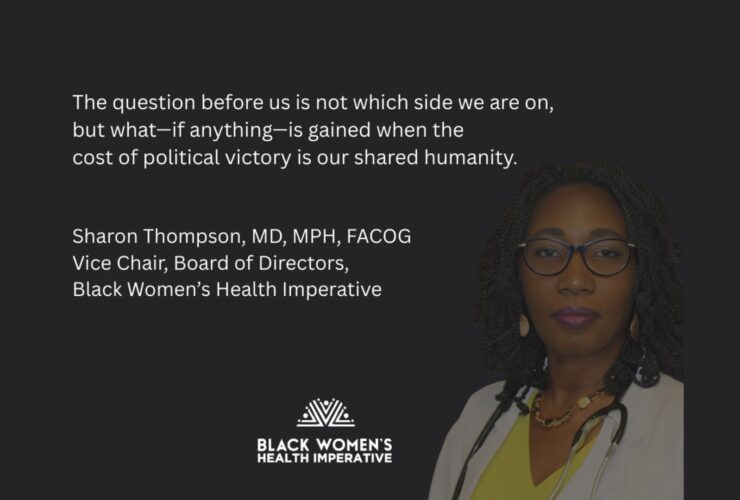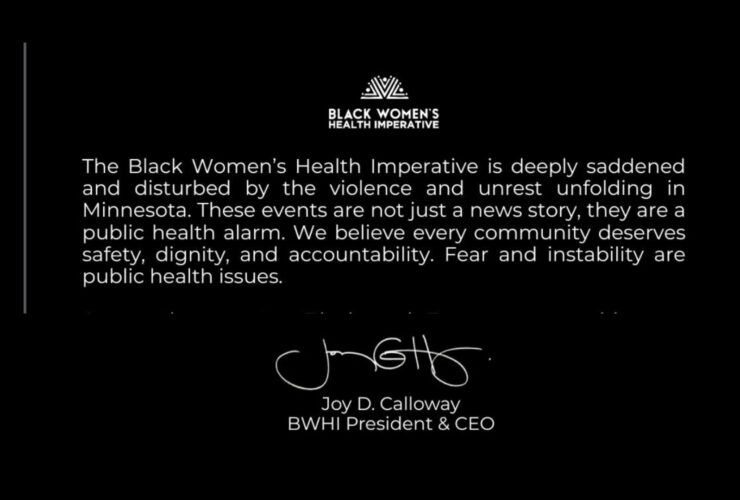ACS Guidelines Will Jeopardize Lives and Severely Limit Disease Detection
Washington, D.C. (August 18, 2020) — We have made significant progress in the fight against cervical cancer over the past several decades, yet, alarmingly, rates are beginning to increase among certain populations. Black women in the United States die from cervical cancer at more than two times the rate of white women. Also, because of delays in screening, Black women are more likely to be diagnosed with advanced cervical cancer than any other racial group.
The Black Women’s Health Imperative (BWHI) is the only national non-profit organization dedicated to advancing health equity and social justice for Black women, across lifespan, through policy, advocacy, education, research and leadership development. The organization identifies the most pressing health issues that affect the nation’s 22 million Black women and girls and invests in evidence-based strategies and best-in-class organizations to accomplish its goals.
At a time when the US health care community should be reaffirming its commitment to preventing cervical cancer, the American Cancer Society (ACS) has released new screening guidelines that fail to preserve access to the most accurate and effective cervical cancer screening options and threatens to put lives at risk.
The new guidelines from the ACS recommend against continued routine use of the Pap test, instead suggesting that women ages 25-65 undergo primary HPV testing every five years. Additionally, the guidelines remove a recommendation to screen women under age 25 altogether. These changes represent a staggering departure from established current clinical practice and screening guidelines from other professional societies.
Co-testing with the Pap test and HPV test together is the preferred screening strategy in the United States among both healthcare providers and women, and it has greatly contributed to saving lives. Real-world data demonstrated through several large domestic studies have found that co-testing detects more pre-cancerous lesions and cervical cancer cases than either test alone. Additionally, one study has shown that screening with the HPV test alone, as the ACS recommends, could miss a cancer diagnosis in 20 percent of women.
The ACS guidelines admit that Black women have significantly higher rates of cervical cancer, yet by limiting screening options these guidelines will widen the racial disparity gap even further. Due to health care disparities, systemic racism, and inequality, Black women often have less access to health care, receive lower-quality care than white women, and have to make decisions to forgo or delay screenings due to concerns about cost and/or lack of health care coverage. The current “one-size-fits-all” approach fails to consider the needs of each individual. This is why access to affordable and comprehensive screening is imperative in ensuring the early detection and treatment of cervical cancer in Black women.
The ACS owes women and healthcare providers an answer as to why they would remove support for trusted testing options when preventive healthcare is already fragile due to the COVID-19 pandemic. They have lost sight of their responsibility to put choice, access, and proven science at the forefront, instead making decisions that are odds with their stated mission to “lead the fight for a world without cancer.”
We strongly urge the ACS to reconsider their new guidelines and vision for the future. Far too many women die needlessly from cervical cancer. However, we have the tools, the data and the ability to make a difference, especially in this country. We invite ACS to join us in preserving all options for women so we can eradicate this disease together.




